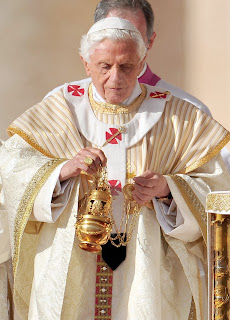It's high time I finished up with Sacrosanctum Concilium so I can move on to another one of the apostolic constitutions from Vatican II. Sacrosanctum Concilium has a lot more to say about the rites of the other sacraments, the Divine Office, etc. -- I wish I could devote posts to all of these issues, but like I said, I need to move on. So, this will be my last post on Sacrosanctum Concilium, and it will focus on the issue nearest and dearest to my heart: sacred music.
Before I dive into that, though, a brief word on the Church calendar (another issue of great interest and concern for me). Chapter V of Sacrosanctum Concilium sets forth the Council Fathers' thoughts on revision of the calendar. Much of what they say is uncontroversial (priority of Sundays over the feasts of saints, renewed focus in Lent on penitential practices and baptismal features, etc.). Only Paragraph 107 deals primarily with revision of the calendar. It reads, in relevant part:
The liturgical year is to be revised so that the traditional customs and discipline of the sacred seasons shall be preserved or restored to suit the conditions of modern times; their specific character is to be retained, so that they duly nourish the piety of the faithful who celebrate the mysteries of Christian redemption, and above all the paschal mystery.
All that talk of preservation and retention sounds great. I don't see anything in here about wholesale changes to saints' feast days or the elimination of the pre-Lent season of
Septuagesimatide, the
Octave of Pentecost, or
Ember Days. Yet another example of the liturgical "experts" running amok after the Council.
My sacred music post is getting shorter and shorter as the time gets later and later. Nothing the Council Fathers state in the chapter on sacred music is particularly jarring or a break with the past -- sacred music should foster unity and solemnity during the liturgy (par. 112) and should be preserved and fostered with choirs and other schools (par. 114 and 115).
Then come the most ignored words in the entire document: "The Church acknowledges Gregorian chant as specially suited to the Roman liturgy: therefore, other things being equal, it should be given pride of place in liturgical services." I really would like to get posters made of this sentence and mail them out to every music director at every Catholic church. I would venture that upwards of ninety percent of parishes in this country hear chant maybe once a year (if you count O Come, O Come Emmanuel as chant). A much higher percentage does not even know that there are other things out there than the "four-hymn sandwich" (consisting of entrance, offertory, communion, and dismissal). Why have we completely eschewed the Propers of the Mass, which, being Scripture, are vastly better suited to the Holy Mass than even the best hymns? Why do most parishes ignore the vast treasury of music from the 2,000 year history of the Church (the past 700-800 years of which yielded a great number of works that still survive)?
Additionally, the tripe peddled by David Haas, Marty Haugen, Michael Joncas, etc. is emphatically not what is supposed to be used during Holy Mass. Sure, some of the songs may be catchy, but that is not the standard by which liturgical music is to be judged. Sacred music is to edify the mind and heart and add solemnity and reverence, not banality, to the sacred rites. I don't deny that some of these songs are uplifting and prayerful (once upon a time, I even enjoyed one or two of them), but listen to them during your own prayer time if this is the case.
Sacrosanctum Concilium also states that the pipe organ is "to be held in high esteem," while making provision for the use of other instruments. These other instruments are permissible "only on condition that the instruments are suitable, or can be made suitable, for sacred use, accord with the dignity of the temple, and truly contribute to the edification of the faithful." Guitar? Negative. Percussion? Negative. Piano?
Negative. None of these instruments are dignified or suitable for sacred use, though they are all capable of producing beautiful music.
Fortunately, as the Church and her members become more authentically Catholic, I think that the state of sacred music in this country is on the road to recovery, thanks in large part to great groups like the
Church Music Association of America and many fine bishops and priests.
As a postscript to this set of posts, I discovered that the Council Fathers took up the question of whether it would be acceptable to fix the date of Easter on a certain Sunday of the year, thereby making the Sunday cycle unchanging from year to year. Their final opinion was that they "would not object" to making such a change. I am relatively indifferent on this topic, but in the end, I am glad that this did not come to fruition -- I believe it is more meaningful to have the date of Easter calculated the same way that it has been for almost 1,700 years.
I will start on either Lumen Gentium or Gaudium et Spes next.


